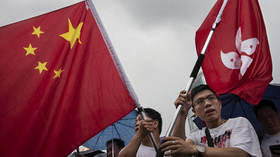Hong Kong activist found guilty of desecrating Chinese flag after becoming ‘first person arrested’ under new security law

A student thought to be the first person arrested under a new national security law passed in June has been found guilty of desecrating the national flag during a street clash with a pro-government group.
Tony Chung Hon-lam, 19, is facing up to three years in jail after a magistrates court in Hong Kong found him guilty of taking part in an illegal assembly and desecrating the Chinese flag. Both charges related to a protest that his now-defunct group held in May last year.
Chung is credited with being the first political figure arrested in Hong Kong under a controversial new national security law. His arrest happened hours after the law came into force on June 30. Shortly before that, Chung’s political group, Studentlocalism, announced it was disbanding its operations in Hong Kong, but that its overseas branches in Australia, Taiwan, and the US would continue their work. He was released the next day on bail without charges.
Also on rt.com Hong Kong activist Joshua Wong sentenced to 13 months in prison after pleading guilty to organizing unauthorized assemblyIn October, Chung was arrested again in a dramatic turn of events involving the US consulate general, which he reportedly wanted to visit to apply for political asylum. The activist was charged with undermining national unity via his social media posts under the new national security law and, this time, denied bail.
The Friday court hearing related to a clash that Studentlocalism activists had with a rival, pro-government group in May last year. During the altercation, Chung and two members of the counter-protest tugged between them a Chinese flag, with the anti-government activist emerging victorious and throwing away the torn piece of fabric.
After reviewing footage of the altercation, the magistrate refused the claims of his lawyer, who argued that Chung didn’t know he was fighting over the national flag and that he was concerned the flagpole could be used as a weapon. He was found guilty of participating in an illegal assembly and desecrating a Chinese state symbol. His punishment is to be decided on December 29, when the court is to convene for sentencing.
Also on rt.com Hong Kong is ‘gaping hole’ in China’s national security, city's head says, aiming to restore political system ‘from chaos’Desecrating the national flag is punishable under Chinese law by up to three years in prison. In Hong Kong, violators would be usually sentenced to fines and community service, though jail times are not unheard of either. The Chinese flag became a common target for anti-government activists, which is why the national security law focused on this type of offence.
In a separate case, Hong Kong media mogul Jimmy Lai was charged on Friday under the national security law. The owner of the protest-backing Apple Daily tabloid was accused of colluding with foreign powers and is facing up to a life behind bars.
Also on rt.com Hong Kong tycoon Jimmy Lai detained over fraud charges until April court hearingLai was arrested in August over the same accusation, as well as on suspicion of fraud. He and two other executives of his media group, Next Digital, were charged in the fraud case earlier this month, after which he was denied bail.
The new national security law was introduced after months of anti-government street protests in Hong Kong. Beijing views the demonstrations as a threat to its sovereignty over the territory, and believes they were incited by foreign powers. The US and its allies supported the protest movement and called the new legislation an attack on the city’s autonomous status, imposing sanctions in retaliation.
Think your friends would be interested? Share this story!














